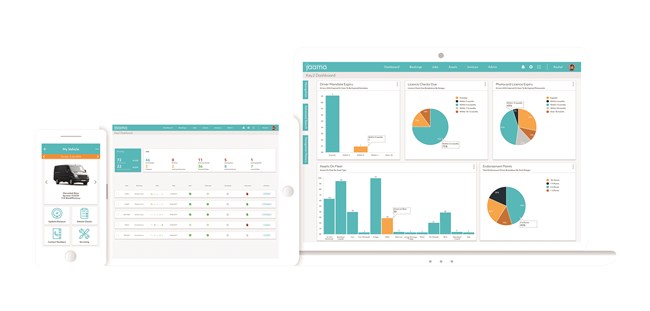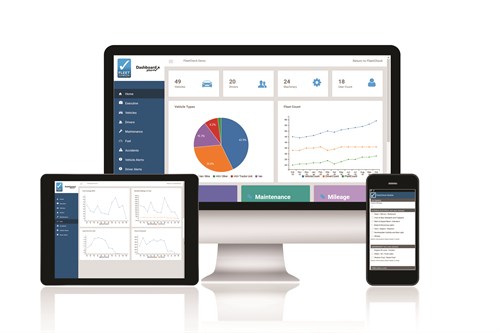We use cookies to ensure that we give you the best experience on our website. If you continue without changing your settings, we will assume that you are happy to receive all cookies on the Business Car website. However, if you would like to, you can change your cookies at any time

The start point for the best source of fleet information |
Dashboard confessional
Date: 12 March 2020 | Author: Jack Carfrae
Jack Carfrae explains what you should expect from modern management software.

You are not alone if your fleet's vital statistics are still living on a spreadsheet. An awful lot of businesses still use Excel to document the numerical side of their vehicle operations, and although there is nothing wrong with that, it is rarely the sharpest or the most intuitive of methods, particularly in the age of digital audits, data security and GDPR.
Any fleet software company will tell you as much - of course they would - but look beyond the sales pitch and there are reasons to get yourself a proper management system. The trouble is, there is no shortage of specialists vying for your business, each promising a digital spring clean, so picking one isn't easy. Talk to them, though, and they will more or less all start with the same spiel: work out what you need beforehand.
"If you are seeing a number of suppliers, you can benchmark them by making sure they fulfil your requirements," says Jaama's managing director Martin Evans. "Say, you have got a fuel interface, you need to produce P11D reports, you are bringing in short-term hire records, it needs to integrate with your accounts system - that kind of thing. Have all of that listed."
Many modern systems are online-only, but there are still plenty that aren't. While suppliers could probably make a case for offline software, web-based platforms are typically the more up-to-date and flexible of the bunch.
"We are dealing with a lot of businesses that aren't asking for anything other than being web/cloud-based at this stage; it is a very popular requirement," says David Gladding, Chevin's global sales and marketing director. "Most of them are still on spreadsheets, let alone anything other than that, so even a move out of that environment would be something of an advantage."
Any system worth its salt should be able to soak up data from different sources, be it olde-worlde spreadsheets or a telematics feed. If it doesn't, you should question its worth and longevity, as Webfleet's sales director for UK and Ireland Beverley Wise explains.
"You need a platform that is able to integrate with other systems, and the ability to pull and push data from your system into other aspects of your business, I think, is vitally important," she says.
"If you are looking at the here and now and not at how your business may change or even how technology may change, you could end up in a Nokia situation - you have got a phone, but other than for calling, it doesn't have the internet, you can't download apps to it - it is just there to do that particular job, and therefore can't integrate into other things.
"I have no idea what may come in the next 5-10 years, but there will definitely be advances, and if you are just buying a standalone,
closed-loop system that is not able to either take data in from other IT systems or push data out of it, you could end up with a defunct system."
The flipside to absorbing all of that information is that you can very quickly end up with heaps of it, analysis of which becomes a job in itself, so you should expect a fleet management system to present data succinctly.
Software companies can whittle down their dashboards (IT-industry speak for the main overview screen) to only the most relevant details, and you should expect as much from any decent provider. Some divvy it up even further according to what individuals are bothered about.
"A finance person wouldn't want to see the workshop environment - and the workshop manager doesn't want to see finances," says Gladding. "What you don't do is throw all the data into one place and ask people to find it themselves - you have to make it very relevant to the individuals operating the system."
Easy though it is to overdo it, it isn't unreasonable to expect a management system to have a few more tricks up its sleeve than the average spreadsheet. If data protection is a priority, then you are likely going to want a company with ISO 27001 accreditation - a recognised information security standard - and the aforementioned soaking up of data sources is another must-have.
Reminders to ensure you are meeting basic levels of compliance are another essential.
"Often, companies running smaller fleets don't particularly need to look at driver training records, they may not want to do medical declarations, or they may not be looking at defect management - maybe they just want a basic system," says Fleetcheck managing director Peter Golding.
"A decent software system will be able to demonstrate the things that need to be completed and almost act as a prompt to say, 'we strongly recommend you do regular licence checks, record accidents and do post-accident interviews'. A lot of the companies we talk to use the software as a way for them to improve their standards, but not necessarily take on an onerous task."

Apps and mobile-optimised web portals are common spin-offs of modern fleet management platforms and it is worth considering the devices your employees use if you intend to make the best of them.
"Almost every company we are talking to recognises the benefits of moving drivers away from pieces of paper and giving them access to an app so they can use that to report back to the office, [but] if you have a very old phone, you may not be operating to the highest standard," adds Golding. "As long as it is still able to be updated, it should be OK, but I think if you are looking at something that is very old, then perhaps one would need to consider [new devices] if you really want to roll this out across your drivers."
One of the most worthwhile elements of sussing out a system is actually nothing to do with the software itself. Dumping new IT on fellow staff out of the blue is guaranteed grief, especially if it takes some understanding, so anyone using it needs to be well aware of the move and trained up ahead of time.
"Think about whether the software is user-friendly," says Evans. "Get other people on board who [will be using it] so that they can figure out whether or not they feel it is too cumbersome. The worst thing in the world is to buy software and then impose it on people when they have had nothing to do with the selection of it.
"I would certainly include the people who would be using it in [tender] meetings; i.e. somebody managing compliance, somebody managing maintenance authorisation, HR - whoever it is."
"Also very important when you are looking at a system is how quickly it can be adopted," adds Golding. "One of the areas we pride ourselves on is that we can train somebody within one hour. One has to ask, if it is going to take you several days to learn to use a system, how intuitive is it and how much buy-in are you going to get throughout the whole of the company?"
Also up for scrutiny is the system's longevity, chiefly the frequency with which the provider updates it. Updates themselves are relatively unobtrusive - Jaama's, for example, typically take place twice a year, last about an hour and can be scheduled overnight - but they should happen often enough for the software to move with the times.
"If I were buying software, one of the things I would look at is how often the system is updated," says Evans. "We send out two main service packs every year, but they are to move our system on. Not everyone does that. and fleet management is moving at such a pace that your system needs to follow it. How often that software is updated will give you a good clue as to whether it will be obsolete in a couple or three years' time."
Given the amount of data potentially absorbed by management systems and the increasing prevalence of artificial intelligence (AI), it is worth considering the software's capacity to act on a predictive basis. It sounds a bit crystal ball, but certain systems are sophisticated enough to draw on multiple and comparative data sources to assist with future decisions.
"More important and apparent nowadays is the predictive side of the business - starting to understand what is coming at us rather than what has already gone," says Gladding. "That data is far more interesting in terms of understanding things like 'is that vehicle in that job fit for purpose?' or 'how does it compare to other vehicles in the same job in terms of performance, cost etc.' and starting to predict what the next purchasing decision is going to be based on both factual, historic information but also predictive information, which is where the introduction of AI and smart intelligence is going to play out even more.
"We have had examples of companies changing their manufacturer based on both historic and predictive data - 'we have always used these, but we have now started to swap out and use these for those particular types of roles'. Efficiency definitely comes into it, as does adjusting the size of the fleet and how the vehicles are powered."











